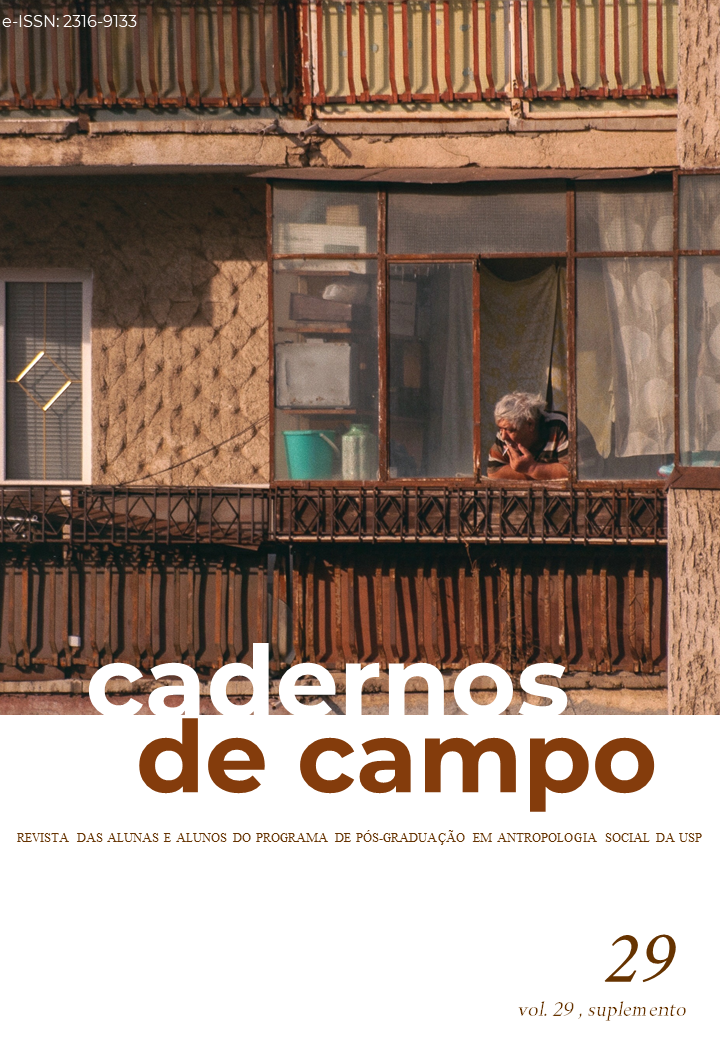Emotions and relations in times of COVID-19
a digital ethnographic during the crisis
DOI:
https://doi.org/10.11606/issn.2316-9133.v29isuplp204-215Keywords:
Covid-19, emotions, relationshipt, mix methods, digitial ethnography, SpainAbstract
The global pandemic of the COVID-19 and its consequences in social, political and economic life have intensified some of the existing inequalities and vulnerabilities, while at the same time have brought about new ways of daily life, marked by confinement. Our research aims to analyze, from the perspective of medical anthropology, the emotional and relational effects of the new situation, and its evolution over the coming months. To this end, we have taken as our starting point the growing centrality of social networks and new communication technologies in a context of social and/or physical distance. We have based on these technologies and their methodological potentialities to collect data on the effects of confinement and the health crisis. To this end, we are collecting qualitative and quantitative data through an online questionnaire that combines open questions with multiple-choice questions. Some preliminary results are presented in this text.
Downloads
References
ALZÚA, Maria Laura; GOSIS, Paula. (2020). Impacto Social y Económico de la COVID-19 y Opciones de Políticas en Argentina. Boletín PNUD América Latina y Caribe.
BAUMAN, Zigmut. (1999). Modernidad líquida. Buenos Aires: Fondo de cultura Económica.
BAUMAN, Zigmut. (2006). Vida líquida. Barcelona: Paidós Ibérica.
BAUMAN, Zigmut. (2007). Tiempos líquidos. Barcelona: Tusquets.
BEST, Paul; MANKTELOW, Roger; TAYLOR, Brian. (2014). “Online communication, social media and adolescent wellbeing: A systematic narrative review”. Children and Youth Services Review, vol.41, pp.27–36. doi: 10.1016/j.childyouth.2014.03.001
BOELLSTORFF, Tom; NARDI, Bonnie; PEARCE, Celia; TAYLOR, T.L. (2012), Ethnography and virtual worlds: a handbook of method. New Jersey: Princeton University Press.
BOURDIEU, Pierre. (1997) Razones prácticas. Sobre la teoría de la acción. Barcelona: Anagrama.
Caballero-Domínguez, Carmem Cecília; Campo-Arias, Adalberto. (2020). “Problemas de salud mental en la sociedad: Un acercamiento desde el impacto del COVID 19 y de la cuarentena”. Duazary, vol.17, n.3, pp1-3.
CARCELLER-MAICAS, Natalia. (2017). Por mí mism@ saldré adelante. Percepciones, representaciones y prácticas en torno a los malestares emocionales en adolescentes y jóvenes. Tesis doctoral. Departament d’Antropologia, Filosofia i Treball Social. Tarragona: Universitat Rovira i Virgili.
CARCELLER-MAICAS, Natalia. (2016). “Youth, Health and social networks. Instagram as a research tool for Health communication”. Mètode. ScienceJournal of the University of Valencia. Universitat de València.
CARTER, Denise. (2005). “Living in virtual communities: An ethnography of human relationships in cyberspace”. Information, Communication & Society, vol.8, pp.148–167. doi: 10.1080/13691180500146235
CASTEL, Robert. (1984). La gestión de los riesgos. De la anti-psiquiatría al post-análisis. Barcelona: Editorial Anagrama.
CASTEL, Robert. (1995). De la exclusión como estado a la vulnerabilidad como proceso. Archipiélago, vol.21, pp.27-36
CASTILLO-TORRES, Daniel; NÚÑEZ-PACHECO, Rosa; LÓPEZ-PÉREZ, Blanca Estela. (2019). “Aportes metodológicos de la etnografía digital latinoamericana basados en World of Warcraft”. Revista uruguaya de antropología etnografía, año IV, n.1, p.31–45.
DE LA SERNA, Juan Moisas. (2020). Aspectos psicológicos del Covid-19. Barcelona: Tektime.
DOUGLAS, Mary; WILDAVSKY, Aaron. (1982). Risk and Culture. Berkeley: University of California Press.
FASSIN, Didier. (2004). “Et la souffrance devient sociale. De l’anthropologie médicale à une anthropologie”. Critique, Tome LX, vol.680-681, pp.16-29.
GUPTA, Akhil; FERGUSON, James. (1992). “Beyond ‘Culture’: Space, Identity, and the Politics of Difference”. Cultural Anthropology, vol. 7. n.1, pp.6-23.
HINE, Christine. (2000). Virtual Ethnography. London: SAGE.
HINE, Christine. (2015). Ethnography for the Internet: embedded, embodied and everyday. Bloomsbury Academic.
ITO, Mizuko; OKADE, Daisuke; MATSUBA, Misa. (2005). Personal, portable, pedestrian: Mobile phones in Japanese life. Cambridge, MA: MIT Press.
JOHNSON, Maria Cecília., SALETTI, Lorena; TUMAS, Natalia. (2020). Emociones, preocupaciones y reflexiones frente a la pandemia del COVID-19 en Argentina. Ciência e Saúde Coletiva, vol.25, suplemento1. pp.2447-2556
MCKEOWN, Thomas. (1990). Los orígenes de las enfermedades humanas. Barcelona: Crítica.
LUPTON, Deborah. (1993). “Risk as a Moral Danger: the social and political functions of risk discourse in public health” International Journal of Health Services, Vol. 23, n. 3: 425- 435.
MARTORELL-POVEDA, Maria Antonia; MARTINEZ-HERNÁEZ, Angel; CARCELLER-MAICAS, Natalia; CORREA-URQUIZA, Martin. (2015). “Self-care strategies for emotional distress among young adults in Catalonia: a qualitative study”. International Journal of Mental Health Systems, (2015) vol.9, n.9. DOI 10.1186/s13033-015-0001-2.
MARTÍNEZ-HERNÁEZ, Angel; CARCELLER-MAICAS, Natalia; DIGIACOMO, Susan; Ariste, Santigago. (2016). “Social support and gender differences in coping with depression among emerging adults: a mixed-methods study”. ChildAdolescPsychiatry Ment Health, 10:2. DOI 10.1186/s13034-015-0088-x
PINK, Sarah.; HORST, Heather.; POSTILL, John.; HJORTH, Larissa.; LEWIS, Tania; TACCHI, Jo. (2016). Digital Ethnography. Principles and Practice. London: Sage.
SEPÚLVEDA, Mauricio. (2011) “El riesgo como dispositivo de gobierno: neoprudencialismo y subjetivación”, Revista de Psicología, Vol.20, No 2: 103- 124.
TORRES, Raymond; FERNÁNDEZ, Maria Jesus. (2020). La política económica española y el Covid-19. Funcas, Cuadernos De Información Económica, vol. 275.
TULLOCH, John; LUPTON, Deborah. (2003). Risk and everyday life. Londres, Sage.
Vera-Villarroel, Pablo. (2020). “Psicología y COVID-19: un análisis desde los procesos psicológicos básicos”. Cuadernos de Neuropsicología/Panamerican Journal of Neuropsychology, vol.14, n.1.
WILKINSON, Richard; MARMOT, Michel. (Eds.). (2003). Social determinants of health: the solid facts. World Health Organization.
Downloads
Published
Issue
Section
License
Copyright (c) 2020 Cadernos de Campo (São Paulo, 1991)

This work is licensed under a Creative Commons Attribution-NonCommercial-ShareAlike 4.0 International License.
I authorize Cadernos de Campo Journal of Anthropology to publish the work of my authorship/responsibility, as well as I take responsibility for the use of images, if accepted for publication.
I agree with this statement as an absolute expression of truth. On my behalf and on behalf of eventual co-authors I also take full responsibility for the material presented.
I attest to the unpublished nature of the work submitted





